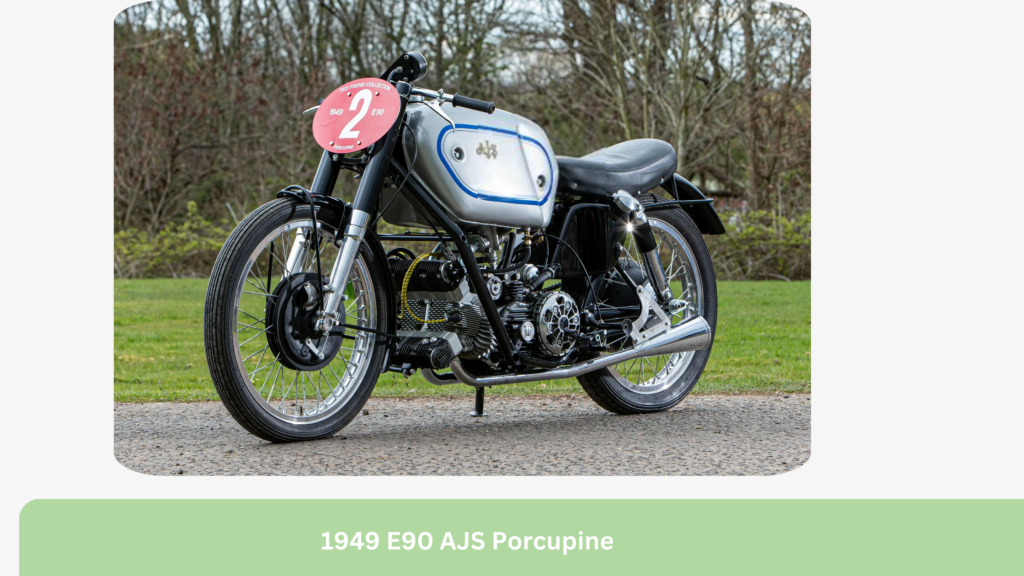The 1949 E90 AJS Porcupine stands as one of the most innovative and rare motorcycles in history. Crafted to push the boundaries of engineering and speed, the Porcupine is more than just a motorcycle—it is a symbol of an era. With limited production, a unique design, and a racing pedigree, the AJS Porcupine continues to captivate motorbike enthusiasts, collectors, and racing historians alike. This article explores the legacy of the 1949 E90 AJS Porcupine, delving into its features, engineering, racing history, and enduring allure.
Overview of the E90 AJS Porcupine
The E90 AJS Porcupine was a product of Associated Motor Cycles (AMC) under the AJS brand. Designed specifically for racing, it featured groundbreaking technology for its time. The motorcycle gained prominence in 1949 when it secured the inaugural FIM 500cc World Championship. The combination of its lightweight frame, unique engine configuration, and advanced suspension system set it apart from competitors.
| Attribute | Details |
| Manufacturer | Associated Motor Cycles (AMC) |
| Brand | AJS |
| Engine Configuration | Horizontal-engine (E90S), Inclined (E95) |
| Engine Capacity | 500cc |
| Production Period | 1945–1954 |
| Notable Achievement | 1949 FIM 500cc World Championship |
Outstanding Engineering
The E90 AJS Porcupine was designed with a clear focus on speed and stability. Its lightweight steel frame allowed better handling and superior high-speed characteristics, which were crucial on narrow racing circuits. The Porcupine’s innovative features included a double overhead camshaft (DOHC) engine, advanced carburetion systems, and unique oil circulation mechanisms.
Engine Innovations
The motorcycle went through two main iterations of its engine design—E90S and E95:
- E90S Engine (1945)
- Type: 500cc, DOHC, twin-cylinder horizontal engine
- Power Output: Approximately 45 bhp
- Fuel System: Twin GP carburetors with a unique float tank system
- Special Feature: The motor ran “backwards,” an unconventional choice for balancing rotational forces.
- E95 Engine (1953)
- Type: 500cc, DOHC, twin-cylinder inclined engine
- Inclination: 45 degrees
- Power Output: 55 bhp at 7,600 rpm
- Additional Features: A jackshaft-driven fuel pump, oil pump, and magneto for enhanced reliability.
Frame and Suspension
The frame design also evolved over time, emphasizing weight reduction and stability.
- E90S: Open frame with “Jam-pot” shocks and Teledraulic forks for better handling.
- E95: Loop-type frame for improved weight distribution and stability at high speeds.
The Racing Legacy of the AJS Porcupine
The AJS Porcupine was built for one purpose: winning races. Its racing legacy is marked by challenges, triumphs, and a lasting impact on the world of motorcycle racing.
- 1947 Isle of Man TT: Despite its potential, the E90 struggled due to reliability issues, with Jock West finishing in 15th place.
- 1949 FIM 500cc World Championship: The AJS Porcupine finally lived up to its promise when Leslie Graham rode it to victory, securing the first-ever FIM 500cc World Championship. This remains AJS’s only championship win.
| Year | Event | Rider | Performance |
| 1947 | Isle of Man TT | Jock West | 15th place (teething problems) |
| 1949 | FIM 500cc Championship | Leslie Graham | Championship winner |
Price and Auction Sales : 1949 E90 AJS Porcupine
The rarity and historical significance of the AJS Porcupine have made it a highly sought-after collector’s item. Its price has skyrocketed over the years, reflecting its iconic status.
- In the 1990s, a private buyer acquired an E95 Porcupine for $228,620.
- At a Bonhams auction in 2011, an E95 model fetched an astonishing $675,000, plus fees.
The Collector’s Perspective
Collectors view the AJS Porcupine as the epitome of motorcycling history. Its rarity, engineering marvels, and racing pedigree make it a prized possession. Owning a Porcupine is about more than just having a motorcycle; it is about preserving a piece of history.
Why is it so coveted? : 1949 E90 AJS Porcupine
- Rarity: Limited production numbers make it a collector’s dream.
- Historical Significance: Its role in shaping motorcycle racing adds immense value.
- Engineering Excellence: The innovative design and features still stand out today.
Restoration and Preservation Challenges
Owning a 1949 AJS Porcupine comes with its set of challenges. Restoration requires a delicate balance between maintaining originality and ensuring functionality.
- Availability of Parts: Many components were custom-made and are no longer produced.
- Expertise Required: Restorers need in-depth knowledge of the bike’s design and history.
- Preservation vs. Restoration: While some collectors aim to restore the bike to its factory condition, others focus on preserving its historical integrity.
Conclusion : 1949 E90 AJS Porcupine
The 1949 E90 AJS Porcupine is much more than a motorcycle; it is a symbol of innovation, a testament to engineering excellence, and a piece of racing history. From its groundbreaking design to its championship-winning legacy, the Porcupine continues to inspire awe and admiration. For collectors, it represents the pinnacle of motorcycle heritage—a timeless icon that embodies the spirit of adventure and the pursuit of speed.
xxc renegade 1000 xxc price in india prices: Will This ATV Become More Popular in 2024?
FAQs : 1949 E90 AJS Porcupine
- What makes the AJS Porcupine unique?
Its innovative design, championship-winning legacy, and limited production make it a rare and iconic motorcycle. - How much horsepower did the E95 engine produce?
The E95 engine produced 55 bhp at 7,600 rpm, making it one of the most powerful engines of its time. - Why is the AJS Porcupine called a “collector’s dream”?
Its rarity, historical significance, and advanced engineering make it highly coveted among motorcycle enthusiasts and collectors. - What were the challenges in restoring an AJS Porcupine?
Finding replacement parts and maintaining the balance between originality and functionality are major challenges in restoration. - What is the significance of the 1949 FIM 500cc World Championship?
It was the first-ever FIM 500cc Championship, and the AJS Porcupine secured a historic victory with Leslie Graham as the rider.
Join us for Free prediction and More information about cricket join us on our Telegram channel

